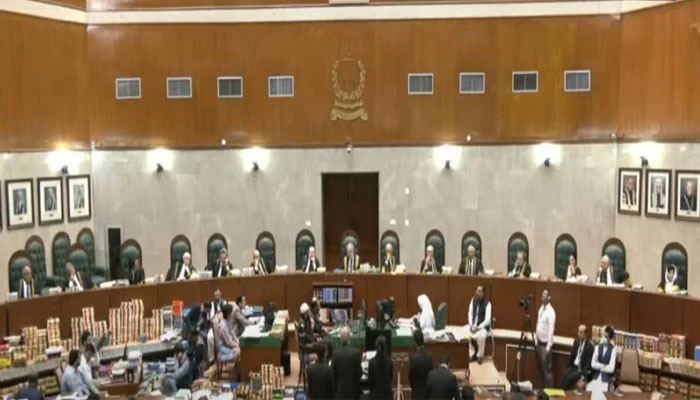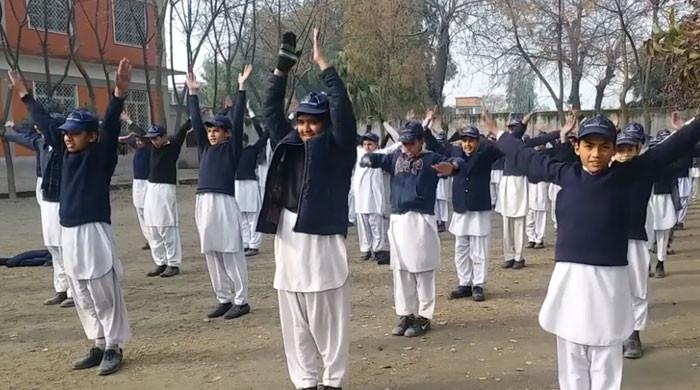 Full court led by CJP Qazi Faez Isa (Centre) is hearing petitions against SC law in this still taken from a video on October 9, 2023. — YouTube/PTVNews
Full court led by CJP Qazi Faez Isa (Centre) is hearing petitions against SC law in this still taken from a video on October 9, 2023. — YouTube/PTVNewsISLAMABAD: Justice Munib Akhtar of the Supreme Court on Tuesday said that asking questions from a petitioner is his prerogative after Chief Justice Qazi Feaz Isa called for letting a lawyer complete an argument first.
The remarks came as the Supreme Court’s 15-judge full court led by CJP Isa resumed hearing of the petitions challenging the Supreme Court (Practice and Procedure) Act 2023 — the law seeking to regulate discretionary powers of the country’s top judge.
Besides the CJP, the full-court bench consisting of Justice Sardar Tariq Masood, Justice Ijaz Ul Ahsan, Justice Syed Mansoor Ali Shah, Justice Munib Akhtar, Justice Yahya Afridi, Justice Aminuddin Khan, Justice Sayyed Mazahar Ali Akbar Naqvi, Justice Jamal Khan Mandokhel, Justice Muhammad Ali Mazhar, Justice Ayesha A Malik, Justice Athar Minallah, Justice Syed Hasan Azhar Rizvi, Justice Shahid Waheed and Justice Musarrat Hilali is hearing the case.
The hearing is being broadcast live on state-run PTV.
In yesterday’s hearing, CJP Isa had observed that parliament passed the law with "good intentions".
During today's hearing, when the chief justice intervened and urged the members to first let Muttahida Qaumi Movement-Pakistan's (MQM-P) counsel Faisal Siddiqui complete his arguments, Justice Munib observed: "Being a part of the bench, I have the right to ask questions."
Responding to his remarks, the CJP said: “Obviously, you can ask questions, but first let the lawyer complete his arguments.”
To this, while addressing the lawyer, Justice Akhtar replied: “[…] my problem is my question, please answer it.”
The CJP further told the fellow judge to write his observations in the verdict if he had already “made up his mind”.
The law
The SC law — passed earlier this year by the Shehbaz Sharif government — gave the power of taking sou motu notice to a three-member committee comprising senior judges including the chief justice. It further aimed to have transparent proceedings in the apex court and includes the right to appeal.
Regarding the constitution of benches, the law stated that every cause, matter or appeal before the apex court would be heard and disposed of by a bench constituted by a committee comprising the CJP and the two senior-most judges.
It added that the decisions of the committee would be taken by a majority.
Regarding exercising the apex court's original jurisdiction, the Act said that any matter invoking the use of Article 184(3) would first be placed before the committee.
On matters where the interpretation of the Constitution is required, the Act said the committee would compose a bench comprising no less than five apex court judges.
About appeals for any verdict by an apex court bench that exercised Article 184(3)‘s jurisdiction, the Act said that the appeal would lie within 30 days of the bench’s order to a larger SC bench. It added that the appeal would be fixed for hearing within a period not exceeding 14 days.
It added that this right of appeal would also extend retrospectively to those aggrieved persons against whom an order was made under Article 184(3) prior to the commencement of the SC (Practice and Procedure), Act 2023, on the condition that the appeal was filed within 30 days of the Act's commencement.
The Act additionally said that a party would have the right to appoint its counsel of choice for filing a review application under Article 188 of the Constitution.
Furthermore, it states that an application pleading urgency or seeking interim relief, filed in a cause, appeal or matter, shall be fixed for hearing within 14 days from the date of its filing.

 6 months ago
50
6 months ago
50





